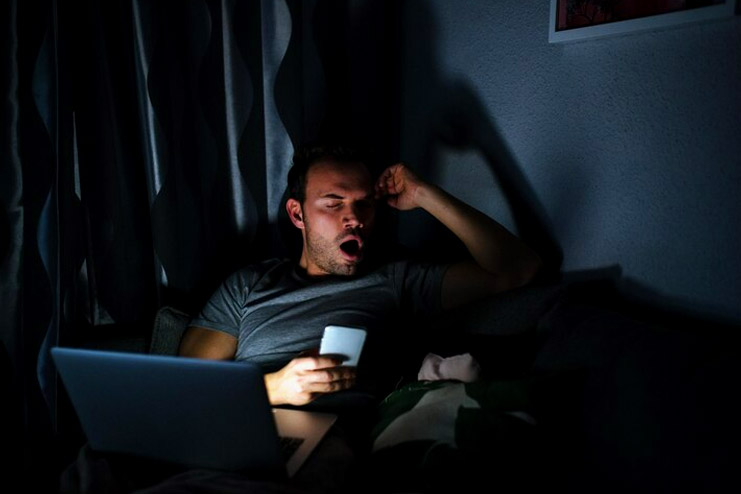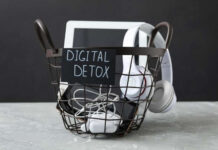Affiliate Disclaimer
Some links in this article are affiliate links. We may earn a small commission if you make a purchase through these links, at no extra cost to you. We only recommend products we find useful to our readersDigital technology has become an indisputable part of modern living. Our daily lives are deeply entwined with the digital world, from the never-ending hum of notifications to never-ending connectivity. Undoubtedly, technology has brought us many advantages and conveniences, but it has also created new difficulties, notably in mental health.
Our everyday routines and social relationships have substantially changed due to the widespread use of digital gadgets, social media platforms, and continual connectivity.
The toll that the virtual world has on our psychological health becomes more and more evident as we work our way through its complexity. An in-depth exploration of the critical necessity of purposeful disengagement is provided as we examine the tremendous implications of digital technology on our mental health.
Understanding Digital Overload

The impact of constant screen time on mental health and cognitive function cannot be over-emphasized in the unrelenting embrace of technology. Everyday life has become increasingly interwoven with the ubiquitous usage of digital devices.
Overusing screens can cause stress and lower productivity. It leads to fewer social interactions, sleep disruptions, and poor sleep quality. Establishing healthy screen habits and striking a balance that suits us may reduce these hazards and improve our mental health. This investigation dives into technology’s complex processes to permanently alter our memories.
Amid the never-ending beep of alerts and the glowing light of displays, it is critical to identify the warning indications for a digital detox.
Your bodies and minds give subtle cues that they are overloaded. You feel compelled to check your phone every few minutes, have trouble concentrating on one thing without having to check your phone, and feel anxious or stressed out if you can’t find your phone. Increased anxiety and irritability, as well as a pervasive sense of fatigue, are all signs and symptoms that you need to go on a digital detox.
The Mental Health Benefits

Adopting a digital detox becomes an effective treatment with several advantages when it comes to mental health. Research has repeatedly shown that reduced screen time has a positive influence on stress and anxiety levels. Your neurological system experiences more stress when you are constantly in front of a screen, and your body produces more and more cortisol, the stress hormone, as a result.
The Datta Meghe Institute of Medical Sciences‘ research demonstrates that these detrimental alterations may materialize as mental health problems, including anxiety, depression, or even low self-esteem. Lowering the amount of cortisol in your body, practicing mindfulness, and taking digital breaks can help you feel less stressed.
Related Article: 14 Ways to Cope With Seasonal Depression for Sustained Mental Health
Studies have demonstrated the harmful consequences of blue light projected from displays. Specifically, these screens can interfere with the generation of melatonin, the hormone that controls sleep. This can eventually result in insomnia and other sleeping problems.
You may increase the amount and quality of your sleep at night by creating an unplugged bedtime ritual, which will help you wake up feeling rejuvenated and ready to face the day. As the complex relationships between technology use and mental health are untangled, it is clear that taking a purposeful vacation from technology reduces stress and anxiety and prepares the body for a revitalizing and refreshing night’s sleep.
Related Article: 18 Ways to Boost and Improve Mental Health for a Better Life
Rediscovering Real Connections

Research has demonstrated that decreased digital distraction promotes improved in-person relationships. Since actual people are more complex than fictional characters on television, using technology might take time away from developing interpersonal ties that foster social skills.
Our brains activate when we look at people’s faces to determine how to communicate with them.
Empirical data supports the transforming potential of digital detoxification in fostering mindfulness and living in the moment. People are frequently drawn away from the richness of the present moment by the constant demands of digital interaction. Cutting the connection with screens promotes mindfulness in day-to-day tasks by raising awareness. It can have physical advantages, lessen tension and anxiety, enhance relationships, enhance sleep, and increase productivity.
Regularly stepping away from social media can be immensely freeing for our mental health. It enables us to re-establish our connection with the outside world and ourselves by removing us from the never-ending barrage of notifications, information, and affirmation from others.
Related Article: Recover Your Resilience – Top 18 Methods for Becoming Mentally Strong
Reclaiming Productivity and Creativity

Digital detoxification is crucial in unlocking increased creativity and productivity as people work to maximize their creative and professional efforts. Reducing or removing your reliance on digital gadgets through a digital detox effectively improves your productivity and overall well-being. It allows you to overcome information overload and reclaim your sense of balance, harmony, and contentment.
According to research, the most significant advantages of reducing your use of the internet and electronic devices are decreased stress, improved sleep, and improved attention span and concentration. These factors help you restore your equilibrium and sense of calm and positively affect your creativity, productivity, and problem-solving skills. A more organized and free-flowing mind can inspire profoundly creative thinking.
Constant connectedness limits the mind’s ability to think creatively, and the ever-present digital world might hinder original creativity. According to research, using digital gadgets obsessively or excessively can hurt your social, mental, emotional, and physical well-being. Reducing your time on the internet and your gadgets might help you feel less stressed, restore your composure, and become more creative.
Strategies for a Successful Detox

Setting individualized, reasonable limitations is the first step toward a successful digital detox. Setting limits aids in lowering tension, anxiety, and depressive symptoms. It also aids in preventing burnout. We should establish boundaries with technology as we do with other areas of our lives. To keep that balance with technology, you could start with some of the boundaries listed below:
- Learn how often you use your devices by keeping track of your screen time.
- Turn off your notifications and stay focused on the topic to minimize distractions.
- Blocking apps can help you stay focused and accomplish your objectives by reducing screen time.
- Only check your email at specific times every day.
- Don’t eat when using the internet.
- When necessary, think about taking breaks from social media.
Cultivating mindful technology involvement after the detox is crucial to preserving the advantages of the digital detox experience. It entails making deliberate decisions about when and how to use digital gadgets, giving meaningful interactions precedence over pointless scrolling.
Studies recommend incorporating mindfulness techniques into routine digital activities, like making intentions before using screens and taking regular pauses to check in with one’s mental health. By using technology with intention and mindfulness, people can maintain the positive effects of their digital detox and reduce their chance of reverting to unhealthy habits.
Conclusion
Scientific research has demonstrated the positive effects of purposeful disconnecting on stress reduction, better sleep, stronger relationships, more productivity, and increased creativity. These benefits of a digital detox on mental health are noteworthy.
We frequently don’t even think about the adverse effects of the digital world because it has become such an integral part of our everyday lives. We must deliberately make time to live in real life to be happy, healthy, and whole human beings. This article urges readers to adopt research-proven tactics and take a deliberate and thoughtful approach to digital interaction.
References
https://moderndiplomacy.eu/2023/06/14/mental-health-in-the-digital-age-navigating-the-impact-of-technology/
https://medium.com/@lomatalnoor/the-impact-of-screen-time-on-mental-health-finding-balance-in-the-digital-age-2be835d93569#:~:text=Excessive%20screen%20time%20can%20lead,promote%20our%20mental%20well%2Dbeing.
https://www.verywellmind.com/why-and-how-to-do-a-digital-detox-4771321
https://www.cureus.com/articles/112862-increased-screen-time-as-a-cause-of-declining-physical-psychological-health-and-sleep-patterns-a-literary-review#!/
https://www.nature.com/articles/s44184-022-00015-6
https://edition.cnn.com/2023/08/21/health/screen-time-child-development-delays-risks-wellness/index.html#:~:text=Technology%20use%20can%20take%20time,how%20to%20interact%20with%20them.
https://www.ncbi.nlm.nih.gov/pmc/articles/PMC10353947/#:~:text=Excessive%20screen%20usage%20can%20also,hinder%20social%20and%20emotional%20competence.
https://www.cnet.com/health/mental/unplug-from-social-media/
https://medium.com/@florian.schroeder.bln/the-power-of-digital-detox-unlocking-productivity-through-switching-off-ca20b96cdc4b
https://www.helpguide.org/articles/addictions/smartphone-addiction.htm
https://www.weber.edu/academicpeercoaching/blog/digital-boundaries.html
https://www.adventurebook.com/connect/digital-detox/
In this Article















